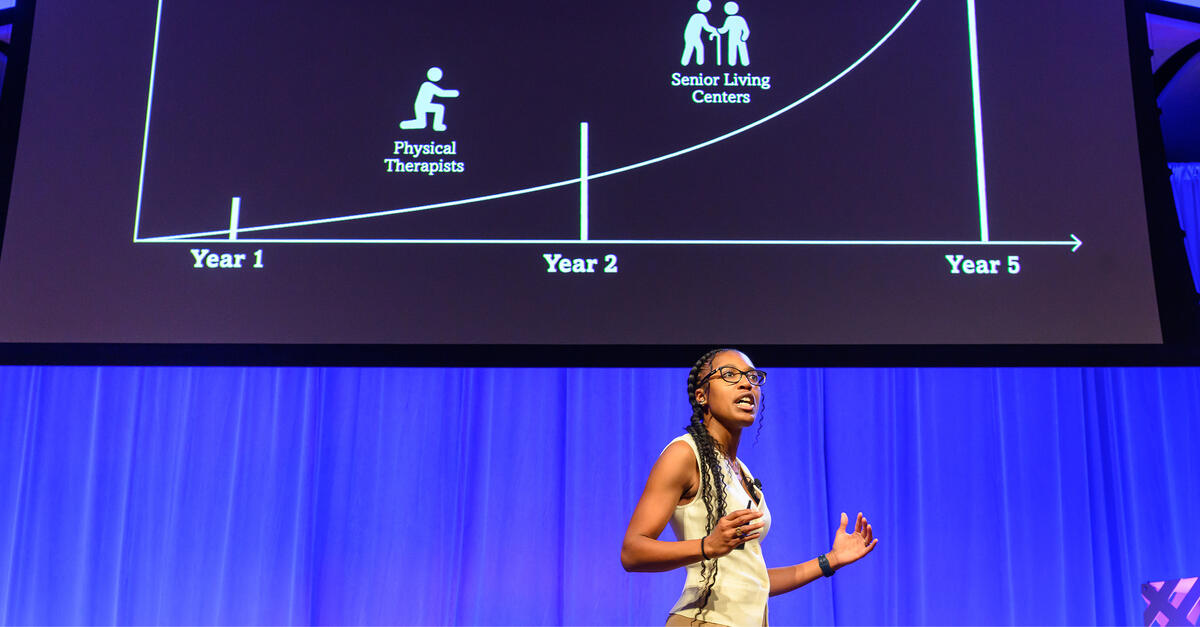open share links
close share links
What you’ll learn: Startups at the 2025 MIT delta v Demo Day showed off AI-powered business automation, clean energy, data analytics, health care, and more.
+ + +
Innovating is always a challenge. Inventing high-impact solutions amid uncertainty, even more so.
Last week, 22 fledgling companies debuted their ideas at MIT’s 2025 delta v Demo Day startup showcase, the finale of the Martin Trust Center for MIT Entrepreneurship’s delta v accelerator.
The delta v name comes from the measure of a change in velocity, an analogy that’s particularly apt this year, said Trust Center managing director Bill Aulet.
“Turn on a screen. Look anywhere around you. There are so many issues to be addressed right now,” said Aulet. “We built a whole entrepreneurial ecosystem not to keep [startups] here but to send them out into the world to have tremendous impact.”
The event encapsulates MIT’s tradition of using innovation to confront urgent issues, said Richard Locke, the John C Head III Dean of MIT Sloan, who listed health care, new manufacturing, artificial intelligence, and the creation of good-paying, highly skilled jobs as priorities.
Here are the 22 startups confronting those issues.
AutoAce builds AI agents for car dealerships to automate repetitive tasks, such as booking appointments.
Carbion is developing a proprietary thermochemical process that converts biomass into battery-grade graphite, providing customers with a domestic low-carbon source of cost-competitive graphite.
Clima is developing an AI-assisted virtual building engineer to help commercial buildings operate more efficiently.
Cognify is developing an Al-driven design intelligence tool to streamline UX testing.
Durability uses computer vision and AI to analyze athletes’ movements to predict potential health risks and offer training plans for rehabilitation or injury prevention.
EggPlan is piloting a fertility service that offers egg freezing with a money-back guarantee, using its eggPlanIQ blood test to determine eligibility.
Forma is creating generative optimization software to build code-compliant, fabrication-ready designs that reduce construction costs and carbon emissions for manufacturers.
Gees is designing an at-home, saliva-based sensor that tracks female hormones and symptom patterns to help women manage conditions such as polycystic ovary syndrome.
Ground3d is creating a digital tool for crowdsourcing hyperlocal environmental data, such as weather events, to improve climate resilience planning.
GrowthFactor is developing an AI-powered real estate analysis platform to help commercial retailers identify high-revenue locations.
Kira is building technology to minimize wastewater and desalinate drinking water.
Kyma is developing an AI-powered medical engagement platform that tracks patient behavior through wearables and alerts physicians to health trends, prompting proactive intervention.

Entrepreneurship Development Program
In person at MIT Sloan
Register Now

LNK is refining decarbonization technologies for sustainable, heavy-duty hydrogen transportation.
Mendhai is developing a digital fitness platform to address female pelvic floor dysfunction.
Nami is creating reusable drinkware cleaning stations for high-traffic areas such as airports and offices.
Pancho is piloting an AI platform that allows independent restaurants to compare prices, centralize ordering, and streamline workflows.
Qadence uses smartphone data to assess fall risk and offer personalized mobility guidance for older adults.
Sensopore is developing diagnostic devices for patients to self-test for common illnesses, connect to telehealth, and get prescriptions shipped to their home.
Spheric Bio is generating a personalized medical implant inside patients’ hearts to reduce stroke risk in people with atrial fibrillation.
Tapestry is creating an AI tool to pre-vet attendees at major industry events, to help sales customers optimize meetings and network more effectively.
Torque is designing an automated financial analysis platform to help private equity investment professionals make faster strategic decisions.
Trazo is producing project management software for interior designers and architects to collaborate on drafting and rendering, which could help expedite projects.
Watch next
Entrepreneurs-in-residence from the Martin Trust Center share startup strategies for uncertain times.

